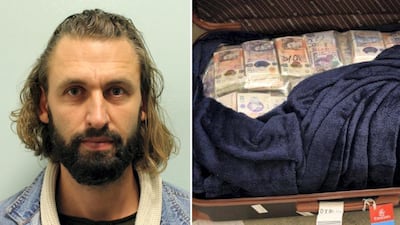British police arrested eight people as part of an investigation into a £50 million ($70.7m) international money laundering racket.
The inquiry was sparked by the arrest of British woman Tara Hanlon in October last year as she prepared to board a flight to Dubai with £1.9 million in her luggage.
Investigations uncovered a wider network involving repeated trips between the UK and Dubai with couriers stuffing bundles of banknotes into their luggage.
Officers arrested three men and five women aged 18 to 48 in a series of co-ordinated raids across Britain on Tuesday, in London, Surrey, West Yorkshire and Greater Manchester.
Ms Hanlon, 30, from Leeds, was arrested in October last year as she prepared to fly from Heathrow airport. She pleaded not guilty to laundering cash found in five suitcases and faces a trial later this year.

A month later, Zdenek Kamaryt, 38, a Czech citizen, was arrested at the same airport as he prepared to fly to Dubai.
He was found with more than £1.3 million in cash vacuum-packed in three suitcases that he had checked in for the flight.
Another £50,000 was found in his hand luggage, including bundles of £50 notes stuffed inside pairs of socks. Police described it as a “brazen attempt” to take money out the country – his bags carried little other than wads of cash.
During interviews with investigators, he refused to say who had given him the money or where he planned to take it.
The latest arrests came after police research of flight data suggested that cash couriers had made repeated trips to Dubai. The mules are thought to be paid several thousand pounds for each trip they make.
Criminals involved in illegal cash-only deals – such as drug dealing – have been forced to come up with an ever-evolving series of ruses to clean the proceeds of crime.
The UK, with its large financial services industry, opaque property market and offshore jurisdictions, is ripe for exploitation by money launderers.
Bank officials, estate agents and lawyers are among the professions who are supposed to report high-value cash deposits in an effort to clamp down on laundering, estimated globally at $1.6 trillion a year.
Former prime minister David Cameron championed a campaign against international corruption and money laundering.
Unexplained Wealth Orders were introduced in 2018, allowing law enforcement to seize cash if the holder cannot explain its origins. But they are used sparingly and the issue slipped down the political agenda.
Ian Truby, a senior officer at the National Crime Agency, said: "Cash is the lifeblood of organised crime. Organised crime groups need to launder it so they invest it in further criminality.
"Our investigation identified millions of pounds of what we suspect are criminal profits being flown out of the UK to be laundered.
"What we have seen is huge shipments of cash, with couriers carrying multiple suitcases, with up to half a million pounds in each case."


